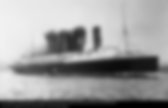

The German spy in America. Wilson's Protest to the Germans. WWI Document Archive > 1915 Documents > Wilson's Protest to the Germans 21 July, 1915.
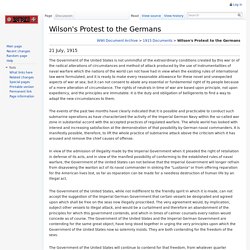
German Response to the Sinking of the Lusitania - The Lusitania Resource. Berlin, May 28, 1915.
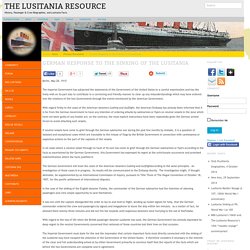
Primary Documents - German Government's Response to the Sinking of the Lusitania, 28 May 1915. Reproduced below is the official German response to U.S. and British protests over the sinking of the Lusitania on 7 May 1915 by German U-boat U-20 on 7 May 1915.

The German note, written by Foreign Minister Gottlieb von Jagow and sent to the U.S. government, argued that while the sinking was regrettable it was nonetheless necessary. Lusitania Warning Notice - HistoryWiz Primary Source World War I. The Lusitania's Last Voyage: Being a Narrative ... America Entangled: The Secret Plotting of Germa... The United States and the war; President Wilson... Lusitania divers warned of danger from war munitions in 1982, papers reveal. A 1980s salvage operation on the wreck of the Lusitania, the Cunard luxury liner that was torpedoed in the first world war, triggered a startling Foreign Office warning that its sinking could still "literally blow up on us".
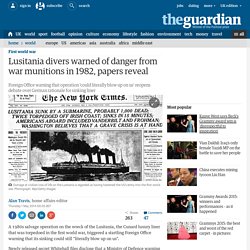
Newly released secret Whitehall files disclose that a Ministry of Defence warning that "something startling" was going to be found during the August 1982 salvage operation raised such serious concerns that previously undeclared war munitions and explosives might be found that divers involved were officially warned in the strongest terms of the possible "danger to life and limb" they faced. Foreign Office officials also voiced serious concerns that a final British admission that there were high explosives on the Lusitania could still trigger serious political repercussions with America even though it was nearly 70 years after the event.
"The facts are that there is a large amount of ammunition in the wreck, some of which is highly dangerous. The Sinking of The Lusitania, America’s Entry into World War I, A Bonanza for Wall Street. On this day 99 years ago, a German U-boat sunk the RMS Lusitania off the southern Irish coast with the loss of 1,195 lives, including 128 Americans. 94 children perished, 31 of them mere babies.
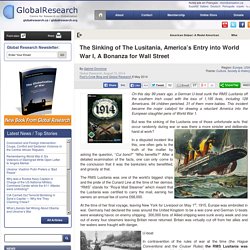
This incident became the major catalyst for drawing a reluctant America into the European slaughter pens of World War 1. Sinking of the Lusitania - Newspaper and Current Periodical Reading Room (Serial and Government Publications Division, Library of Congress) Lusitania, Sinking of. Lusitania’s History and Prelude↑ Commissioned by the Cunard Line, the HMS Lusitania was designed by Leonard Peskett (1861-1924) and built by John Brown and Company.

It was fitted for service on 26 August 1907. Sinking of the Lusitania. Online - Lost Liners - Lusitania. The Lusitania carried a healthy complement of American passengers when she departed New York for Liverpool on May 1, 1915, despite a published warning from the German authorities that appeared in U.S. newspapers the morning of her departure.
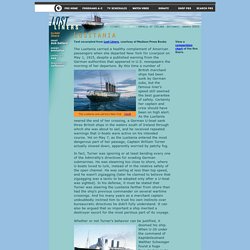
By this time a number of British merchant ships had been sunk by German subs, but the famous liner's speed still seemed the best guarantee of safety. Certainly her captain and crew should have been on high alert. As the Lusitania neared the end of her crossing, a German U-boat sank three British ships in the waters south of Ireland through which she was about to sail, and he received repeated warnings that U-boats were active on his intended course. Yet on May 7, as the Lusitania entered the most dangerous part of her passage, Captain William Turner actually slowed down, apparently worried by patchy fog.
In fact, Turner was ignoring or at least bending every one of the Admiralty's directives for evading German submarines. About the USA - History of German-American Relations > 1901-1939: Early 20th Century. World War I Up until the 20th century, German-American relations focused chiefly on immigration and commerce.
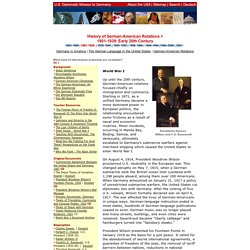
Starting in 1871, as a unified Germany became a more dominant power in European politics, the relationship encountered some frictions as a result of naval and economic rivalries. Minor incidents, occurring in Manila Bay, Beijing, Samoa, and Venezuela, ultimately escalated to Germany's submarine warfare against merchant shipping which caused the United States to enter World War I. On August 4, 1914, President Woodrow Wilson proclaimed U.S. neutrality in the European war. This changed abruptly on May 7, 1915, when a German submarine sank the British ocean liner Lusitania with 1,198 people aboard, among them over 100 Americans. When Germany announced on January 31, 1917 a policy of unrestricted submarine warfare, the United States cut diplomatic ties with Germany. President Wilson presented his Fourteen Points in January 1918 as the basis for a just peace.
Hitler's Rise to Power. The Lusitania. The Lusitania sailed on May 1st 1915 from New York bound for Liverpool.
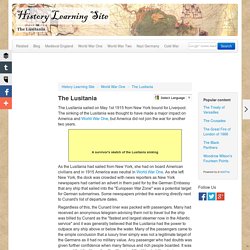
The sinking of the Lusitania was thought to have made a major impact on America and World War One, but America did not join the war for another two years. As the Lusitania had sailed from New York, she had on board American civilians and in 1915 America was neutral in World War One. As she left New York, the dock was crowded with news reporters as New York newspapers had carried an advert in them paid for by the German Embassy that any ship that sailed into the "European War Zone" was a potential target for German submarines. Some newspapers printed the warning directly next to Cunard's list of departure dates. Regardless of this, the Cunard liner was packed with passengers. German submarine sinks Lusitania — History.com This Day in History — 5/7/1915.
History_1901.pdf. Der Fall Lusitania. Schiffversenkung: Die "Lusitania" war kein erlaubtes Ziel. Hochmut kann tödlich sein: "Das ist der beste Witz, den ich seit langem gehört habe", sagt am Morgen des 1.

Mai 1915 William Turner, der 58-jährige Kapitän des stolzen Passagierdampfers "Lusitania". Ein Reporter hatte ihn gefragt, ob nicht deutsche U-Boote die 202. Atlantiküberquerung der "Lusitania", die an diesem Tag in New York beginnen und am 8. Mai in Liverpool enden sollte, zu einem unkalkulierbaren Risiko machte? Die Frage des Reporters ist durchaus begründet; immerhin erscheint an diesem Samstagmorgen in mehr als einem halben Dutzend Blättern der Metropole und in rund 40 Zeitungen in den ganzen USA eine kleine Anzeige. Doch Turner, den selbstbewussten Chefkapitän der Cunard-Reederei, ängstigt diese Anzeige nicht - war er doch erst wenige Wochen zuvor mit dem viel kleineren Dampfer "Transsylvania" einem deutschen U-Boot entkommen.
Die Versenkung der Lusitania. Die Versenkung des »zivilen« Passagierdampfers »Lusitania« am 7. Mai 1915 wird auch heute noch von vielen Historikern als deutscher »Massenmord auf See« verurteilt und muss als Beweis für die »Grausamkeit« und »Kaltblütigkeit« der deutschen Obersten Heeresleitung herhalten. Taucher fanden nun in dem Wrack riesige Mengen an militärischem Material, das belegt: die »Lusitania« war ein getarntes Kriegsschiff und der Tod ihrer ahnungslosen Passagiere wurde von den Briten billigend in Kauf genommen.
Der Aufschrei der Weltöffentlichkeit war groß: Am 7. Mai 1915 versenkte das deutsche U-Boot U 20 unter Kommandant Schwieger den britischen Dampfer Lusitania, der innerhalb von 18 Minuten unterging. 1.198 Passagiere und Besatzungsmitglieder, darunter 124 US-Amerikaner, fanden dabei den Tod. Für die US-Regierung war dieser »Massenmord auf See« ein Grund, in den Krieg einzutreten. Der Untergang der Lusitania - Tragödie eines Luxusliners. Doch war es kaltblütiger Mord auf Befehl eines deutschen U-Boot-Kommandanten? Spätere Theorien besagen, dass eine von zwei fürchterlichen Explosionen an Bord der Lusitania von der Detonation der Munition ausging, die das Schiff an Bord hatte. Und damit wäre der Angriff eine legitime Kriegshandlung gewesen.
Lusitania - Die wahren Hintergründe der Vesenkung durch U 20 im Jahr 1915. "Queenstown, 7. DER SPIEGEL 45/1972 - Schmutziges Geschäft. Ein Täuschungsmanöver brachte Amerika in den Ersten Weltkrieg: Der Untergang des britischen Passagierschiffes "Lusitania" war von Winston Churchill vorgeplant, behaupten britische Autoren. Amerikas Weltkrieg-I-Präsident Woodrow Wilson war schockiert. Vor ihm lag ein Geheimpapier, das völlig ramponierte, woran Wilson einmal geglaubt hatte.
Verbittert steckte er das Papier in einen Briefumschlag und versiegelte ihn.